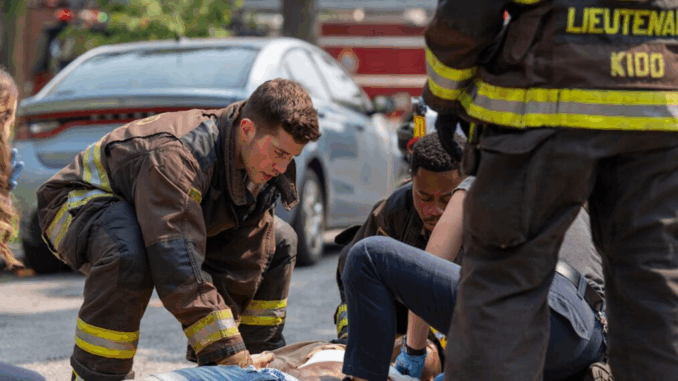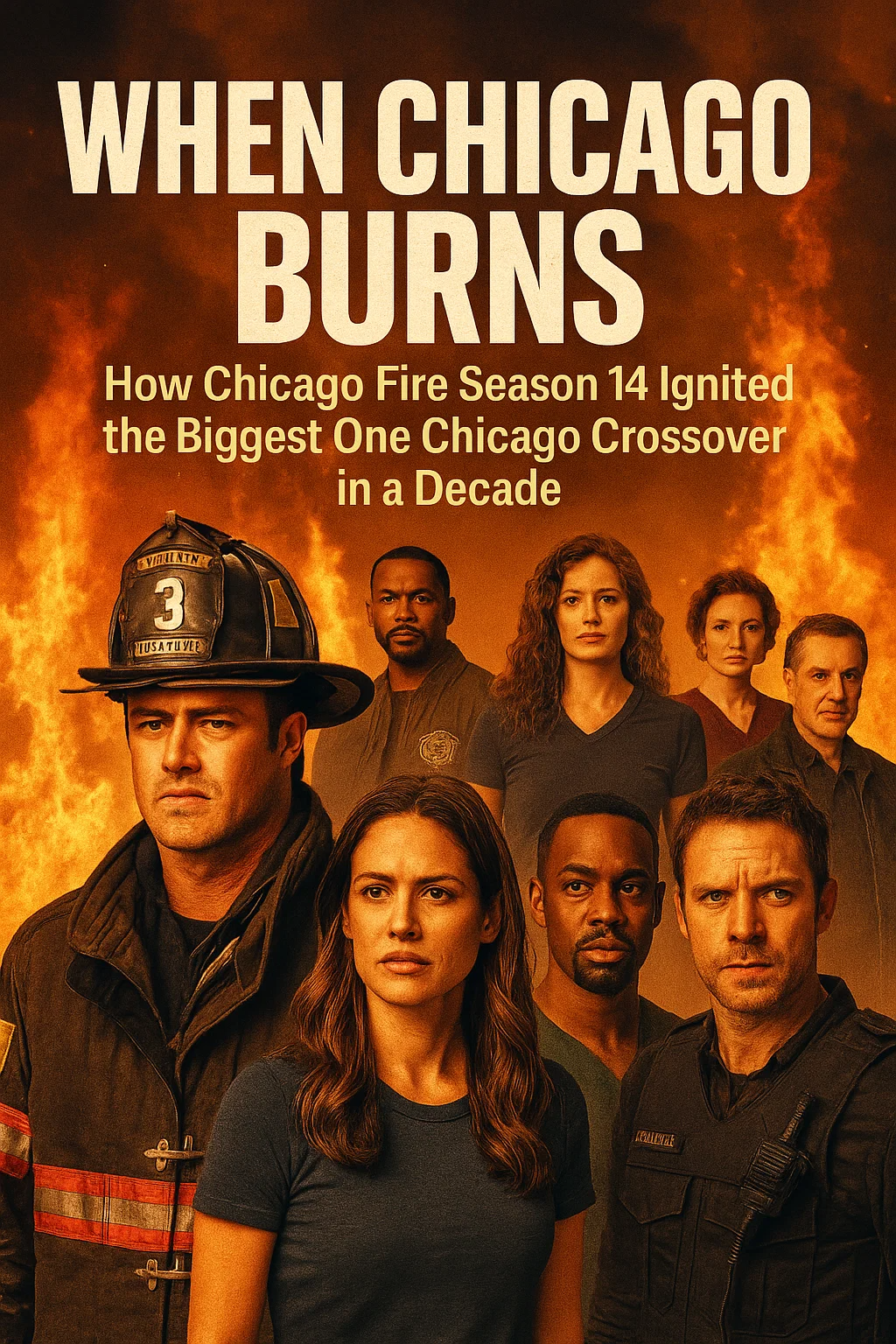
A City on the Brink
For more than a decade, Chicago Fire has been the beating heart of NBC’s One Chicago franchise — the show that started it all. But with the explosive premiere of Season 14, the city that never sleeps may finally be pushed to its breaking point.
What began as a typical shift for Firehouse 51 quickly spiraled into something much darker. Amid a tense update in Stellaride’s ongoing baby storyline and a controversial new dynamic between Novak and the firehouse’s rebellious newcomer, the hour ended with Fire Commissioner Dom Pascal (Dermot Mulroney) delivering a chilling revelation: almost half of Chicago’s emergency calls are going unanswered.
The fallout from that single discovery could change the One Chicago universe forever.
The 49% Crisis
In the opening minutes of the Chicago Fire Season 14 premiere, chaos reigns across the city. The CPD arrives late to a gas station fire sparked by a mugging. Later, suspected gang members open fire near Firehouse 51 — and this time, no police backup comes at all.
When Pascal digs into the mystery, he uncovers a hidden city report showing that 49% of 911 calls have been left unresolved in recent months. The reason? A massive wave of dispatch layoffs, ordered under the guise of “budgetary restructuring.”
Even Violet Mikami (Hanako Greensmith) hears rumors from a friend in the system: entire districts are running blind. Crews are overworked, calls are being rerouted across the city, and desperate citizens are beginning to lose faith in the people meant to protect them.
“It’s the perfect storm,” Pascal warns in the episode’s final minutes. “When the city stops answering its people, chaos answers instead.”
The Fallout Spreads Across the Franchise
The effects of Chicago Fire’s new crisis are already bleeding into the rest of the franchise.
On Chicago P.D., Voight (Jason Beghe) admits that the Intelligence Unit still hasn’t been reinstated following a citywide corruption probe. That decision has led to a 9% spike in homicides and a 22% rise in gun violence — the same violence creeping into Fire’s opening scenes.
Meanwhile, Chicago Med’s Season 11 premiere shows Gaffney Medical Center struggling to manage a mass casualty incident without sufficient coordination from first responders — an eerie parallel that suddenly makes a lot more sense.
Behind closed doors, the new mayor’s chief of staff, Annette Davis, tells Pascal that the crisis was “inherited from the previous administration.” But her proposed solution — to rotate firehouse and squad closures in order to reduce costs — might be the most dangerous idea yet.
With fewer responders and slower dispatch times, Chicago’s streets are a ticking time bomb. And fans can already sense what that might lead to.
The Road to a 2026 One Chicago Crossover
The last major One Chicago crossover — the 2019 bio-terror event — was an adrenaline rush that united Fire, P.D., and Med in a single, city-spanning emergency. But the 2026 crossover teased by Chicago Fire Season 14 could be something even bigger: a citywide collapse that forces all three series to join forces just to survive.
If the mayor’s office continues to suppress Pascal’s report, the truth might eventually leak to the public — or worse, to the city’s criminal networks. The result? Total chaos.
Imagine Chicago in flames: Firehouse 51 battling building blazes without backup, Voight’s team fighting through riots, and Gaffney Med overflowing with victims from across the city. It’s the kind of television event that could rival Dick Wolf’s legendary 2014 crossover between Chicago Fire, Chicago P.D., and Law & Order: SVU.
Except this time, the danger wouldn’t come from a single villain or crime syndicate — it would come from the system itself.
Why Voight’s Silence Matters
A key detail in the P.D. premiere suggests the crossover may still be months away. When Voight meets with IAD Commander Mark Devlin to discuss Intelligence’s shutdown, he never mentions the 49% report — something that would clearly strengthen his case for reinstatement.
Why? Because no one outside the mayor’s office and Firehouse 51 knows about it.
It’s a deliberate narrative choice: a slow burn that allows the truth to spread organically between the shows. Mouch might tell his wife Trudy Platt (Amy Morton) at the 21st District, and from there, the secret could reach Voight’s desk. Once it does, the entire city will be on alert.
The stage is being set, and the dominoes are starting to fall.

A City Ready to Explode
If the One Chicago franchise follows this story to its inevitable breaking point, the result could be the darkest and most emotionally charged event in its history. Each show is already exploring themes of overreach, burnout, and moral gray areas. Now, those threads are about to converge under one terrifying question:
What happens when the system designed to save lives stops working?
The answer may arrive in 2026 — when One Chicago finally unites again, not just to save the city, but to prove that heroes still exist when everything else falls apart.